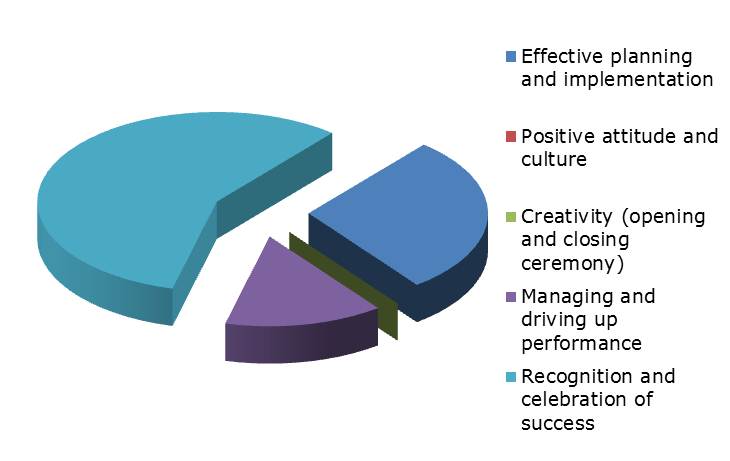Each month Innergy research an area of business that is pertinent to our customer database, carrying out a brief survey and providing some practical ideas that can be immediately implemented to help individuals, teams and organisations overcome some of the key challenges they face.
We asked: “From the recent Olympic Games experience, what is the one lesson that your business should take away and improve?”

Let’s focus on the most significant lesson that businesses should take away and improve that received over 50% of the votes; recognition and celebration of success.
Before we look at the how, we must first look at the why. Does it really matter or make a difference?
We always ask delegates on our leadership programme to reflect on the period in their professional life when they performed at a high level for a sustained period of time. The answers coming back always include the four following ‘conditions’ that existed at the time:
- We knew what we were looking to achieve as a team or business
- I was totally clear on my manager’s expectations of me
- We were part of a team that worked well together
- Our efforts were recognised and valued and success was celebrated
If we are looking for peak performance from the team, recognition and celebration are key ingredients.
We know it makes sense, so why doesn’t it happen and why in our poll is it identified as the most significant habit that people have to improve. There are two main reasons it doesn’t happen:
- We don’t review what we have achieved. There are three perspectives we need to take:
- Take an overview – this helps confirm the way forward and identify any obstacles
- Focus – on decisions, key priorities, relevant activity
- Look back and review – If we don’t find the time to review what we are doing or have done, it is unlikely we will reflect on who to recognise or what to celebrate.
- We don’t find the time to recognise others or celebrate as we are too busy focusing on what we didn’t do well or have yet to do.
So here are some top tips to ensure that achievement is recognized, success celebrated and the positive culture of recognition is developed:
- Individually develop the habit of observing colleagues and team members and ensure that you feedback whenever you observe positive behaviors and actions. Too often we take the good stuff for granted. To create a positive culture, there should be five times more positive feedback than negative.
- At the regular team meetings, build in a review session. A simple W3 process (what’s worked, what hasn’t worked, what can we do differently) will flush out opportunities to recognise and celebrate success.
- Train people to feedback effectively. Often people don’t feedback (about both positive and negative) because they are not confident on how to do it or they feel insincere on the positive feedback. Try the very simple acronym of AID when giving feedback about something positive. Here is an example:
- Action – “You went out of your way to support the new guy who was struggling.”
- Impact – “That boosted his confidence and made him feel supported.”
- Do more of – “I would appreciate you continuing to support him whenever he is struggling.”
- Ask the team to nominate the individual they think deserves recognition.
- Delegate upward and get the most senior people in the business involved when it comes to celebrating success – people will remember it (and know you organised it).
- Write about it, photo it, video it, do it publically with people’s partners invited – people enjoying sharing how they done well at work with their friends and family so give them something tangible to share.
- Capture the moment and add a picture to the intranet – it demonstrates that celebration is on the agenda.
- Pull together a team of people who care about the business or department and do some brainstorming about ways of celebrating.
We might not have Olympic achievements to celebrate or world breaking performance to recognise, however most businesses employ quality individuals who strive to achieve and deliver results and they should be valued. Recognition and celebration often costs nothing and can mean everything.
Comments